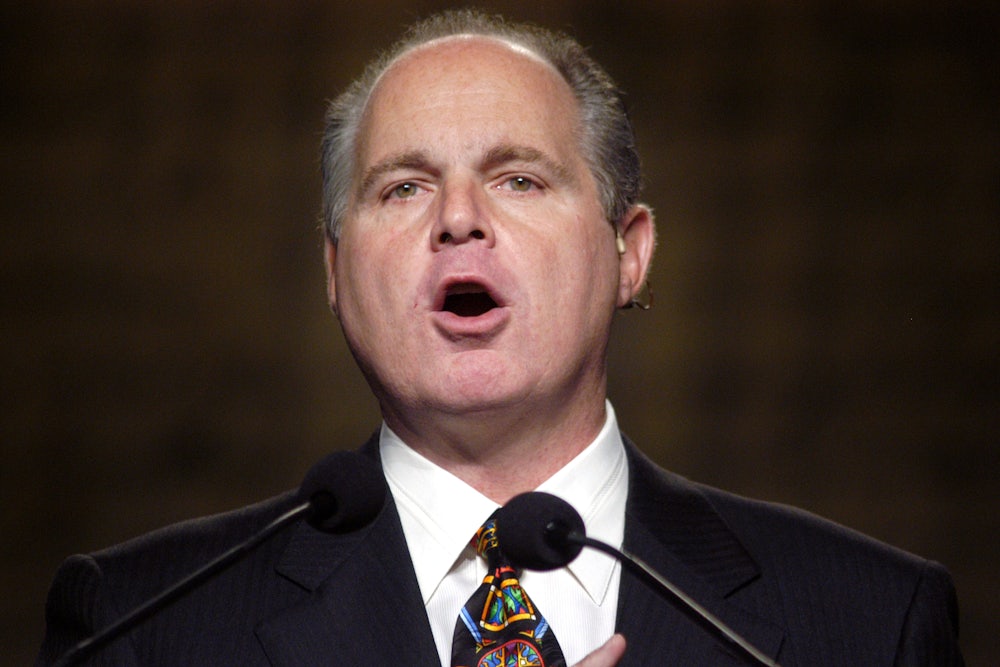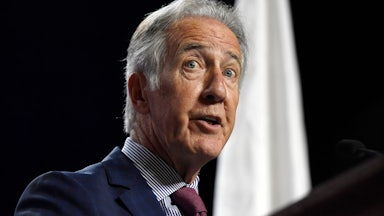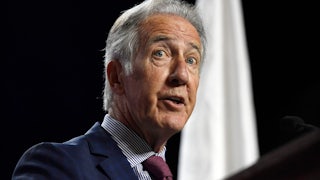If you weren’t around for it, it’s a little hard to explain how and why Rush Limbaugh, the right-wing broadcaster who died this week, was (very briefly) a member of the commentary crew for Sunday NFL Countdown back in 2003.* Nationally televised professional sports is a realm so allergic to controversy, and to any association with partisan politics, that television commentators are more likely to be suspended for getting political than they are to be hired for their politics. So how did Limbaugh—whose politics weren’t just incidental but the obvious core of his appeal—end up a Disney employee tasked with commenting on National Football League games? One reason is that he was, at the time, a more or less mainstream figure.
Living in the present United States, where the conservative movement has effectively created an entire parallel media ecosystem that allows right-wingers to cut themselves off entirely from any other sources of news or entertainment, it’s hard to remember that in the not-too-distant past, right-wing media figures still largely depended on the “mainstream media” for their platforms. And the mainstream media happily provided those platforms.
For those too young to remember his prime (and I’d probably count myself among those too young to truly remember his Clinton-era heyday despite my occasional exposure to him in a conservative relative’s truck or on their bookshelf), it’s difficult to convey just how nasty and bigoted Limbaugh was but also how mainstream he was. And it is therefore difficult to understand exactly how reactionary the entire American media environment—and, consequently, the political culture—was in that era.
If anything, in his later years Limbaugh dialed it back a bit just because it would’ve been impossible even for him to keep getting away with the sort of things he routinely said and did at the peak of his fame. A complimentary (and representative) New York Times story from 1990 shows how the establishment laundered his bigotry right from the start. While clearly contemptuous (the piece makes a point early on of specifically delineating his weight), the profile basically treats Limbaugh as a guilty pleasure. “So why has Rush Limbaugh become the new titan of talk?” the paper asks. “Maybe it is America’s shock at discovering a new species: a funny right-winger.”
Feel free to scour the piece for examples of his humor. One of them is only mentioned in the vaguest possible terms. Rush, we’re told, “has cut some of his material, especially on homosexuals.” More specifically: “He killed a running bit on AIDS after two weeks.” Limbaugh is then given space to apologize: “It’s the single most regretful thing I’ve ever done,” he tells his profiler.
That profiler would’ve done the reader a favor by describing the “running bit” in a bit more detail. While, as far as I know, no recordings have managed to surface (and every contemporary newspaper reference describes it with that same telling vagueness), the “gag” was that he’d name people who died of AIDS while playing a “funny” song like “Kiss Him Goodbye” or “Looking For Love In All the Wrong Places.”
This is a particularly nasty example of Limbaugh’s “humor,” but it’s completely in line with basically every other “joke” he ever told. Limbaugh’s appeal was as the guy who said “what we’re all thinking,” if you understand “we” to mean certain men who perhaps felt they couldn’t get away with saying (in mixed company, at least) what Rush said (or “joked”) about women, gay men, and Black people.
Even as outlets like The New York Times continued to characterize his audience as bumpkins, they appreciated his right-wing “comedy,” revealing the degree to which 1990s elites were actually some of his most eager fans. Limbaugh was a pioneer in the creation of the parallel conservative media, turning talk radio into a key arm of it. But television kept beckoning. By March of 1990, he had his first gig as a TV host, sitting in on CBS’s Pat Sajak Show. He’d go on to get a (Roger Ailes–produced) syndicated talk show a few years later. He’d periodically resurface in the occasional sitcom or movie cameo throughout the rest of the decade before finally ending up with that ill-fated stint in the Sunday NFL Countdown booth. (He was fired after making racist comments about Donovan McNabb, a black quarterback for the Philadelphia Eagles.)
In other words, Rush—despite (or, more probably, because of) his rancid bigotry—was, in the 1990s, just a normal celebrity. Meanwhile, the most prominent left-of-center voices on American television during the Clinton years were Bill Maher and Al Franken. It was a deeply reactionary mass culture in which certain figures could say anything so long as their targets were marginalized or powerless.
The era in which the mass media constantly elevated right-wing figures like Limbaugh or Matt Drudge without being able to offer up any left-wing alternatives basically ended, for many reasons, with the Bush administration. By the close of his career, Limbaugh was just another character in the right’s information ecosystem, easily avoidable if you didn’t intentionally expose yourself to conservative media. By 2009, it would have been odd to see ABC treating Rush as a largely noncontroversial celebrity in the way that it did in 2003. The mainstream media still loves elevating conservative arguments and Republican pundits, but it mainly sticks to ones that don’t intentionally court controversy.
These efforts to avoid controversy have lately led some figures in our current political ecosystem to imagine that corporate media and its offshoots are “canceling” anyone they deem too controversial. These figures claim that the left has become too censorious and that free expression is under attack because people face social opprobrium or economic consequences for saying particular (usually “insensitive”) things. Most (but by no means all) of the critics of this thing called “cancel culture” are men. Interestingly, many of them are also members of Generation X.
I don’t think this generation of thinkers simply grew more conservative as they aged. I suspect their obsession with cancel culture is actually a reflection of their memories (accurate or not) of the discourse in the 1990s, and their acute awareness of how much the terrain has shifted. It could be interpreted as a desire to return to the rules that governed the discourse then. It needn’t be a specific desire for figures as offensive as Rush Limbaugh to be treated as “normal” celebrities again. But if you came of age at a time when it was broadly accepted that Limbaugh was the mouthpiece of Real America and if, for example, you embarked on a career based on understanding and explaining politics—making arguments about how liberals and Democrats should act and what they should say to win over Real America—there must be a strong temptation to want to yank the political environment back to the place it was in when you developed your original understanding of it. Seeking to reconstruct the past may be easier than having to readjust your worldview to account for changes in conditions.
The sort of person who used their job for many years to advise Democrats on how far up to turn the racism dial would clearly find it hard to accept that the correct answer now is to turn it the other direction. Even many of those who weren’t so cynical in their approaches probably still have trouble shaking that ingrained sense that this is a nation of Dittoheads at heart. Cancel culture discourse allows those people to believe they remain correct about America’s essential character—and to imagine that there is a conspiracy of young activists (backed by cowardly editors) to silence those who dare express themselves in ways that were perfectly kosher back then.
I don’t mean this to be an all-encompassing explanation for cancel culture or some skeleton key to the psychology of the aging centrist. But it’s a fact that Rush Limbaugh was uncancelable back in the 1990s when the newspapers politely euphemized his AIDS jokes. I invite you to decide for yourself if that was a freer environment for speech or one more conducive to open and honest debate.
* A previous version of this article misstated which NFL show Limbaugh commentated for in 2003.








